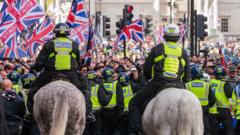Who Are the Eight Charged for Disorder at the Unite the Kingdom Rally?

Published: 2025-09-15 18:15:24 | Category: technology
Protests in central London last weekend saw significant turnout and unrest, resulting in charges against eight individuals. The events unfolded during a rally led by right-wing activist Tommy Robinson, attracting between 110,000 and 150,000 attendees, whilst around 5,000 people participated in an anti-racism counter-demonstration. The Metropolitan Police's handling of the situation has led to a total of 24 arrests, with ongoing efforts to identify additional suspects.
Last updated: 30 October 2023 (BST)
Key Takeaways
- Approximately 110,000 to 150,000 people attended the Unite the Kingdom rally.
- About 5,000 individuals were involved in a counter-demonstration against racism.
- The Metropolitan Police initially reported 25 arrests, later revising it to 24.
- Eight people now face charges including assault and public order offences.
- 1,500 officers were deployed to manage the protests.
- Police are seeking information on 11 additional individuals related to the disorder.
Background of the Protests
The protests on Saturday were primarily centred around the Unite the Kingdom rally, organised by Tommy Robinson, a controversial figure known for his far-right views and activism. The rally aimed to unify supporters against perceived threats to British values, particularly regarding immigration and cultural issues. In contrast, the anti-racism counter-demonstration sought to oppose Robinson's message and promote a more inclusive society.
Police Response and Arrests
The Metropolitan Police described the violence that occurred during the protests as "wholly unacceptable." Initial reports indicated that 25 individuals had been arrested, but this figure was later corrected to 24. Among those arrested, eight individuals now face charges, including serious offences like assault and public order violations. Notably, three of the arrested were women, and the rest were men.
Deployment of Officers
To manage the large crowds and ensure public safety, the Metropolitan Police deployed 1,000 officers to the scene. An additional 500 officers were brought in from other police forces, including those from Leicestershire, Nottinghamshire, and Devon and Cornwall. This significant police presence reflects the authorities' commitment to maintaining order during high-tension events.
Current Investigation and Next Steps
The Metropolitan Police are actively investigating the incidents that transpired during the protests. They have released images of 11 individuals they are endeavouring to identify and locate, which suggests that the investigation is ongoing and extensive. Alongside the arrests, one person received a caution, while 11 others were bailed under investigation, indicating that law enforcement remains vigilant in addressing any further offences that may arise from the protests.
Public Reaction to the Protests
The protests have sparked considerable debate across social media and various news platforms, with many people expressing their opinions on both sides of the argument. Supporters of Robinson argue for the right to free speech and assembly, while opponents highlight the need to combat racism and bigotry. The division in public opinion illustrates the larger societal tensions surrounding immigration, nationalism, and race relations in the UK today.
Implications for Future Protests
The events of the weekend serve as a reminder of the potential for unrest during large gatherings, particularly those involving polarising figures. The Metropolitan Police's response may shape how future protests are managed, with a likely increase in police presence at similar events. Furthermore, the outcomes of the ongoing investigations could influence public sentiment and responses to future demonstrations.
Conclusion
The protests in London last weekend underscore the deep divisions in contemporary British society, particularly regarding issues of race and nationalism. With eight individuals facing charges and ongoing investigations, the situation remains fluid. As protests continue to draw large crowds, the need for careful management by authorities will be crucial in maintaining public safety and preventing violence. What will be the long-term impact of these events on public discourse and protest culture in the UK?
#LondonProtests #TommyRobinson #PublicOrder
FAQs
What sparked the protests in London last weekend?
The protests were sparked by a rally led by right-wing activist Tommy Robinson, aimed at unifying supporters against perceived threats to British values, in contrast to an anti-racism counter-demonstration.
How many people were arrested during the protests?
Initially, 25 arrests were reported, but this number was revised to 24, with eight individuals now facing charges including assault and public order offences.
What measures did the police take to manage the protests?
The Metropolitan Police deployed 1,000 officers to the protests and called in an additional 500 officers from other forces to ensure public safety and manage the large crowds.
Are there ongoing investigations related to the protests?
Yes, the Metropolitan Police are actively investigating the incidents and have released images of 11 individuals they are seeking to identify in connection with the disorder.
What are the implications of these protests for future gatherings?
The recent events may lead to increased police presence and tighter management of future protests, reflecting the authorities' commitment to maintaining order during high-tension gatherings.



